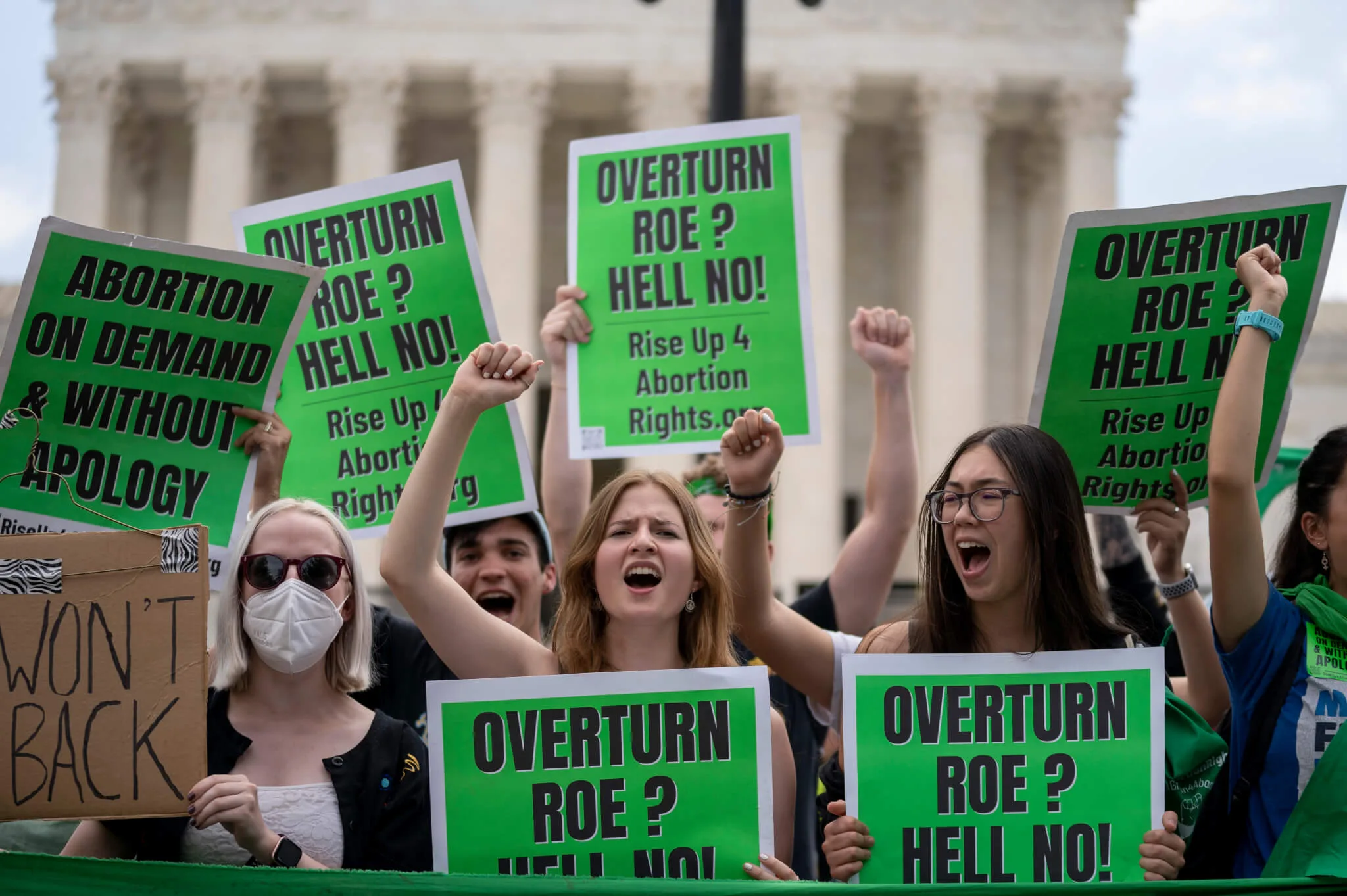
FILE - Abortion-rights protesters regroup and protest following Supreme Court's decision to overturn Roe v. Wade in Washington, Friday, June 24, 2022. Voters in a handful of states will weigh in on abortion in this year’s election in the aftermath of the Supreme Court’s ruling that overturned Roe v. Wade and left abortion rights to the states. (AP Photo/Gemunu Amarasinghe)
Women and girls across the United States have suffered devastating experiences over the past year when seeking abortions and routine reproductive health care as a result of the Supreme Court’s decision to overturn Roe v. Wade last June.
A new study from the University of California San Francisco’s Advancing New Standards in Reproductive Health (ANSIRH), a collaborative research group, highlights just how difficult some of those experiences have been. The report shares the stories of women and girls who have found it more difficult to receive abortion care in the 14 states that have banned or restricted abortion following the Court’s decision in Dobbs v. Jackson Women’s Health Organization.
The group received 50 submissions from health care providers describing complications patients experienced and cases where they received low-quality medical care.
All of the submissions were received between Sept. 2022 and March 2023, and the patients represent a wide range of different ages, income levels, and racial and ethnic backgrounds. Nearly half of the patients were reported to be Black or Latino, and 38% of the patients were between the ages of 18 and 24.
Let’s take a look at the findings:
Ectopic Pregnancy, Early Miscarriage, and Fetal Anomalies
Several narratives were submitted by health care providers that describe instances of ectopic pregnancy.
According to the American College of Obstetricians and Gynecologists, ectopic pregnancies are never viable and will always become life threatening to the mother. Ectopic pregnancies are generally treated with surgery or methotrexate, a medication which stops cells from growing, thus ending the pregnancy.
Patients whose narratives were submitted for this study, however, had to go through extra steps in order to end their ectopic pregnancies, such as having to consult with multiple physicians.
Other patients delayed ending their ectopic pregnancies because they were fearful or wary of seeking pregnancy-related care in their home states where abortion bans were in effect. In these cases, the patients traveled outside of their states to receive abortion care, which can be dangerous because delaying the end of ectopic pregnancies can lead to a myriad of complications, such as hemorrhage, growth of the placenta into surrounding organs, and uterine rupture, according to the National Institutes of Health.
One patient had to have one of her fallopian tubes removed after it ruptured. A physician wrote that this patient was “lucky to be alive.”
Other patients experienced delays in receiving early miscarriage care. One case described in the study details how one woman moved from a state where abortion is legal to a state with an abortion ban. Soon after, she was diagnosed with a miscarriage, but the pregnancy tissue had not passed. When she sought care, medical professionals in her new home state declined to provide treatment. Ultimately, she had to travel back to her previous state to receive care.
“Nearly one year out from the Dobbs v. Jackson Women’s Health ruling, we’re seeing real-life horror stories occur time and again as people are blocked from accessing the care they need,” NARAL Pro-Choice America communications director Ally Boguhn said in a statement. “In some states, these bans intimidate doctors and hospitals, stop them from providing critical care like miscarriage management, and put pregnant people’s lives and health in danger.”
Several other narratives submitted described instances of pregnancies complicated by fetal anomalies, most of which were described as “being incompatible with neonatal life,” according to the physicians cited in the report. In these cases, termination was not possible in the states where the patients resided because their lives were not in danger (the only allowable exception to these abortion bans).
Obstetric Complications in the Second Trimester
Other patients whose experiences were shared during this study suffered obstetric complications in the second trimester, which usually means an abortion is necessary.
The most common complication involved preterm prelabor rupture of membranes (PPROM) in the second trimester. This is when the sac, or amniotic membrane, surrounding the fetus breaks before a pregnancy has reached full term. As ANSIRH notes, contrary to the standard of care prior to Dobbs, where women experiencing PPROM would be offered an abortion, the patients were instead sent home and told to return when labor started, or when they experienced signs of infection.
In several of these cases, patients developed severe infections. One patient had to spend time in an ICU to manage the severe sepsis and bacteremia (bacteria in the bloodstream) that developed. Another patient who experienced PPROM at around 16 to 18 weeks was sent home following her initial diagnosis. A physician wrote that this patient was “bleeding from everywhere” and that it was a “miracle” she did not die.
Despite the circumstances, this patient still expressed fear over possibly “going to jail” for what had happened to her.
“These findings reinforce what abortion advocates have known and vocalized all along: that abortion is health care, and without access to abortion, health outcomes will suffer,” Planned Parenthood’s vice president of Abortion Access Danika Severino Wynn said in a statement. “Pregnancy can be complex and unpredictable, whether planned or unplanned. Moreover, health care providers who are charged with providing care for pregnant people must be able to use their expertise to provide evidence-informed care for their patients without fear of criminalization.”
Delays Obtaining Abortion Care
Other narratives cited in the study involved cases where patients experienced long delays in obtaining abortion care because of the states they lived in.
For many of these women, arranging care out of state was “logistically complicated and expensive,” according to the study. Long wait times for appointments at out-of-state clinics created even longer delays in care.
As the study states, delays certainly happened prior to the Dobbs decision, but the post-Dobbs delays were notable because of just how long some of them lasted.
One patient, a 15-year-old girl who asked her mom for help after discovering she was pregnant, had to wait seven weeks before having an abortion. By this point, she was about 16 to 18 weeks pregnant.
Delays in care also put abortions out of reach for some of these patients. One narrative described a girl “under age 15” in juvenile detention. Because her state had an abortion ban in effect, and because of a “number of other barriers,” she went on to give birth, the study states.
Underlying Medical Conditions and Trauma Complicate Care
For patients with underlying medical conditions or traumas, receiving care was even more complicated. The need to travel out of state for care to get around abortion bans exacerbated their conditions.
One patient’s mental health suffered after she decided to travel to receive an abortion out of state. According to the physician who shared her story, she was a rape victim who traveled on an airplane for the first time, and spent her whole paycheck doing so.
“She left our clinic today by [emergency medical services], transported to the local [emergency department (ED)] for suicidal ideation,” the physician wrote. “She was raped two months ago. Each episode of morning sickness causes [post-traumatic stress disorder (PTSD)] so intense she tried to take her life yesterday. If abortion was legal in her home state, several things would be different.”
Ultimately, the girl did not receive an abortion that day.
Politics

New Biden rule protects privacy of women seeking abortions
Under the new rules, state officials and law enforcement cannot obtain medical records related to lawful reproductive health care with the goal of...

Biden marks Earth Day by announcing $7 billion in solar grants
The Biden administration on Monday announced the recipients of its Solar For All Program, a $7 billion climate program that aims to lower energy...

6 terrifying things that could happen if the Comstock Act is used to target abortion
Does 1873 sound like a really, really long time ago? Well, that’s because it is—but if Republicans and far-right anti-abortion activists have their...
Local News

Conjoined twins from Berks County die at age 62
Conjoined twins Lori and George Schappell, who pursued separate careers, interests and relationships during lives that defied medical expectations,...

Railroad agrees to $600 million settlement for fiery Ohio derailment, residents fear it’s not enough
Norfolk Southern has agreed to pay $600 million in a class-action lawsuit settlement for a fiery train derailment in February 2023 in eastern Ohio,...




